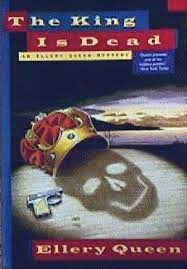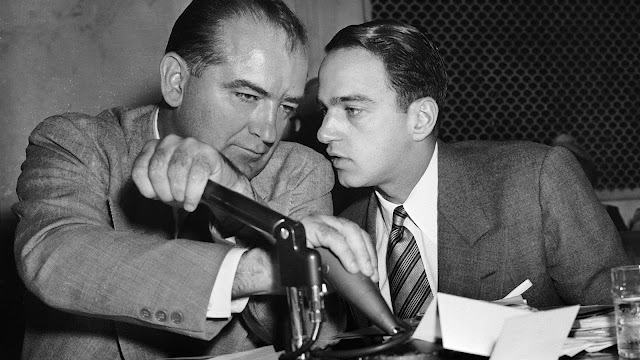Long ago in days I'm told
Were ruled by lords of greed
[...]
Kings and queens and guillotines
Taking lives denied...
--"Kings and Queens," Aerosmith
That's the trouble with democracy, Queen. You're one of the intellectual, liberal, democratic world, aren't you? You never get anywhere....All you do is jabber, jabber, jabber, while history shoots past you into the future.
[...]
I think, Mr. Bendigo, you tend to underestimate the intellectual, liberal democrat when aroused....
--philosophical exchange from The King Is Dead, by Ellery Queen
Ellery Queen is one of the great names of Golden Age detection whose oeuvre I still have not entirely read. One of these days I'll finish Christie's Passenger to Frankfurt and track down an edition of Carr's The Hungry Goblin, but in the the meantime there are some decent, even excellent perhaps, Queens left for me to read.
 |
| The 1994 HarperPerennial edition (I wanted to scan my own but my scanner is not working--sorry for poor quality!) |
Ellery Queen's The King Is Dead was published in 1952, making it by my count the twenty-first of thirty-four novels by them (including the four from the Sixties which were plotted by Frederic Dannay and ghost written by Theodore Sturgeon and Avram Davidson).
It's technically considered the last of EQ's lauded Wrightsville series (set in the New England town of Wrightsville, the authors' homage to small town America), although Wrightsville only pops up in a late chapter, when Ellery does a series of interviews there, which are written up in notebook form.
Additionally, the first chapter takes place at the New York apartment of Ellery and his father. As for the rest of the book, one contemporary reviewer from Manhattan--Kansas, that is--colorfully described it as
a dipsy doodle into the incredible sphere once occupied by E. Phillips Oppenheim and the inscrutable Dr. Fu Manchu.
I wish someone had blurbed that line on an edition of the book!
After the first chapter, which might have been entitled Assault on a Brownstone, Ellery and his father, Inspector Queen, are spirited off to the mysterious Caribbean island fastness, virtually its own country, of munitions magnate King Bendigo. Armed men, led by King's brother Abel--yes, we're in for a lot of Queenian Biblical allegory here--came into their apartment, but it's not quite a kidnapping, as they agree to accompany these men to Bendigo's island only at the behest of, apparently, President Truman himself, who expressly enjoins the inspector to snoop around while he's down there. King Bendigo, you see, has become a virtual power unto himself, intervening into the course of history on multiple occasions; and clearly the U. S. would like to put a stop to him for good and all.
The reason the Queens are wanted is to investigate the series of letters which have been sent to Abel, threatening his impending murder. The investigation, which is leisurely to say the least, points to Abel's other brother, the weakling, alcoholic liberal Judah, as the culprit; and all sorts of precautions are taken to prevent him from attempting to kill Judah at the appointed time which the last letter generously gives. Abel is in a locked room with his trophy wife Karla, while Judah is in his own room under observation. Yet when Judah points an empty gun and fires it at the appointed hour, King in the locked room somehow is shot at that very moment. And a gun can't be found in the locked room!
This locked room problem doesn't occur until about 60% of the way into a 90,000 word book, which tries the patience of some readers, who aren't necessarily that interested in the depiction of the wicked munition merchant's ménage and mise-en-scene. This is one of Queen's "high concept" books, like And on the Eighth Day, where the authors want to get across some of their ideas about politics in 1952.
Personally, events of the last decade have made this aspect of the novel more interesting to me than it would have been in, say, 2012. Over these years we have seen the Western liberal order badly shaken. A massive European war potentially looms due to the machinations of a murderous Russian tyrant and around the world authoritarian nationalists are coming to power as people lose faith in traditional liberalism.
You listen to the prattle of the Republican party these days and you'd think we were literally back in 1952, with war with China imminent and a Communist (or critical race theorist) hiding under every bush. Or even worse than '52, really, since Joe McCarthy was never actually elected president or even was a serious threat in that regard. Many of today's so-called Republicans, the Marjories and the Madisons and the like, like the John Birchers of the past (their spiritual ancestors) would have deemed Dwight Eisenhower a dangerous Communist dupe.
Suddenly The King Is Dead seems to have taken on a lot of relevance, at least in my eyes.
 |
| these guys, ugh--McCarthy with odious assistant Roy Cohn, who lived until 1986, long enough to influence a recent American president |
Frederic Dannay and Manfred Lee were themselves, I have no doubt, consensus Fifties liberal Democrats, meaning that, while they rejected Communism, they were committed to the social agenda of the Adlai Stevenson and Hubert Humphrey types and vigorously opposed Fifties McCarthyism and Red-baiting. The philosophical climax of The King Is Dead comes, appropriately, right before the locked room shooting, when Ellery, the author's mouthpiece, gets into a debate with the odious Abel. I have quoted a bit of that above.
When Ellery goes back to Wrightsville to investigate he finds out more about the character of King Bendigo. Who does this guy sound like:
His main trouble, as I as able to piece it together, seems to have been that he always bit off more than he could chew. He constantly made grandiose plans, overextended himself, and fell flat on his face. What he did have, as evidenced by the record, was the ability to charm hardboiled New England monied people into loosening up....
I mean, wow, there we have the once and hopefully not future president in all his puffed up, meretricious glory.
Still a lot of reviewers seem indifferent, or even antagonistic, to this aspect of the book, then and now. Not so much because they oppose the authors' political views necessarily (arms dealers have never to my knowledge been positively portrayed in a mystery), but because they read mysteries for murder plots not preachments. One contemporary reviewer dismissed King Is Dead as a virtue-signaling "tract," another as simply "pretentious." Still, hugely influential New York Times reviewer Anthony Boucher, another Fifties liberal, must have liked the book a lot, for my HarperPerennial edition from 1994 cover-quotes from his review in the New York Times: "Queen presents one of his noblest puzzles [with The King Is Dead]."
Putting politics aside, I think there is a fine puzzle here. It's a neat locked room situation, fairly clued. I've seen the Wrightsville chapter referred to as an "information dump," but I enjoyed the depictions of the interviewees and the whole thing is larded with some clever clues indeed, all of which passed over my head! With the limited number of significant characters in the book, not to mention the allegorical indications, it's not hard to have notions when it comes to culpritude, but you may not grasp the entire pattern. In any event, the how and the why are cleverly clued.
Today people compare the island setting of the megalomaniac munitions magnate to something out of Ian Fleming. Yet the first James Bond novel was published in England a year after The King Is Dead appeared, so it may be that Queen was more original here than people think. Did EQ influence Agatha Christie's 1954 thriller Destination Unknown? That's a mystery for another day!
So I enjoyed The King Is Dead, all in all. Would I want to read it a second time? Probably not. The book I think takes too long to get to the locked room mystery, even though I don't agree with the charge that the novel is a padded short story. Maybe a padded 60,000 word novel! Still, I'm glad I read it. The problem the Queenish boys is a good one and the political passages are timely, distressingly timely. The past does repeat itself, or perhaps the past is never actually past. It lies there and festers.

No comments:
Post a Comment